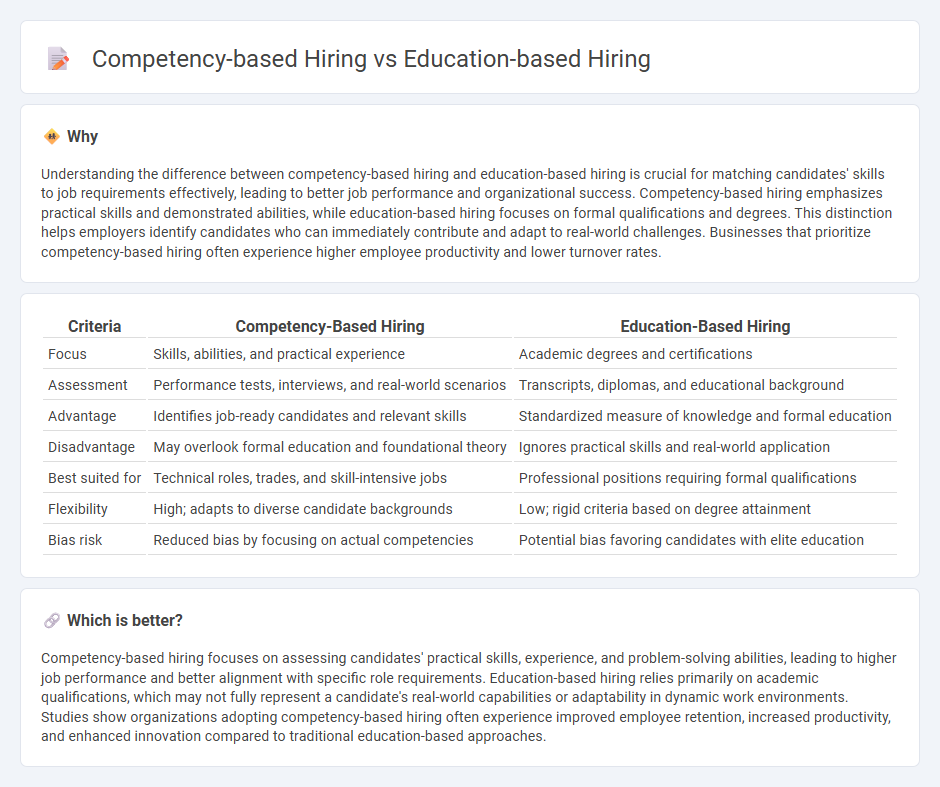
Competency-based hiring prioritizes candidates' practical skills, problem-solving abilities, and proven performance over traditional academic credentials, focusing on measurable job-related competencies to enhance workforce effectiveness. Education-based hiring relies predominantly on formal qualifications, degrees, and certifications as primary indicators of a candidate's potential suitability for a role. Explore how shifting to competency-based hiring can improve talent acquisition and organizational success.
Why it is important
Understanding the difference between competency-based hiring and education-based hiring is crucial for matching candidates' skills to job requirements effectively, leading to better job performance and organizational success. Competency-based hiring emphasizes practical skills and demonstrated abilities, while education-based hiring focuses on formal qualifications and degrees. This distinction helps employers identify candidates who can immediately contribute and adapt to real-world challenges. Businesses that prioritize competency-based hiring often experience higher employee productivity and lower turnover rates.
Comparison Table
| Criteria | Competency-Based Hiring | Education-Based Hiring |
|---|---|---|
| Focus | Skills, abilities, and practical experience | Academic degrees and certifications |
| Assessment | Performance tests, interviews, and real-world scenarios | Transcripts, diplomas, and educational background |
| Advantage | Identifies job-ready candidates and relevant skills | Standardized measure of knowledge and formal education |
| Disadvantage | May overlook formal education and foundational theory | Ignores practical skills and real-world application |
| Best suited for | Technical roles, trades, and skill-intensive jobs | Professional positions requiring formal qualifications |
| Flexibility | High; adapts to diverse candidate backgrounds | Low; rigid criteria based on degree attainment |
| Bias risk | Reduced bias by focusing on actual competencies | Potential bias favoring candidates with elite education |
Which is better?
Competency-based hiring focuses on assessing candidates' practical skills, experience, and problem-solving abilities, leading to higher job performance and better alignment with specific role requirements. Education-based hiring relies primarily on academic qualifications, which may not fully represent a candidate's real-world capabilities or adaptability in dynamic work environments. Studies show organizations adopting competency-based hiring often experience improved employee retention, increased productivity, and enhanced innovation compared to traditional education-based approaches.
Connection
Competency-based hiring aligns job requirements with specific skills and abilities, ensuring candidates possess practical expertise essential for performance. Education-based hiring evaluates candidates based on academic credentials and formal qualifications, emphasizing theoretical knowledge and institutional achievements. Integrating both approaches creates a comprehensive recruitment strategy that balances proven competencies with academic background, optimizing workforce effectiveness.
Key Terms
Qualifications
Education-based hiring prioritizes formal degrees and academic achievements as primary qualifications, often emphasizing pedigree from top institutions. Competency-based hiring centers on a candidate's practical skills, experience, and ability to perform specific job tasks regardless of educational background. Explore how shifting from education-based to competency-based hiring can enhance workforce quality and diversity.
Skills Assessment
Skills assessment in education-based hiring often prioritizes academic credentials and formal training, which may not fully capture practical abilities or problem-solving skills. Competency-based hiring emphasizes evaluating candidates through real-world tasks and measurable skills, ensuring a better match for job requirements. Explore how integrating advanced skills assessments can optimize your recruitment process.
Job Performance
Competency-based hiring emphasizes candidates' specific skills and abilities directly linked to job performance, leading to more accurate predictions of success in the role. Education-based hiring often prioritizes academic credentials, which may not fully reflect practical competencies needed for job effectiveness. Explore deeper insights into how competency-based hiring enhances workforce productivity and business outcomes.
Source and External Links
Skills-Based Hiring Revolutionizes Opportunities for Young Workers - Skills-based hiring shifts focus from traditional college degrees to candidates' skills and capabilities, making the job market more inclusive amid barriers young people face, such as financial hurdles and unequal education access.
What does higher ed need to know about skills-based hiring? - Skills-based hiring is growing among employers, and higher education institutions are adapting by credentialing skills gained through work experience and aligning curricula with employer needs without discarding the value of college degrees.
There's more to skills-based hiring than just removing degree requirements - Removing degree requirements is just a first step; effective skills-based hiring requires reliable methods to assess candidate skills beyond degrees to avoid perpetuating inefficiencies and ensure quality hiring outcomes.
 dowidth.com
dowidth.com